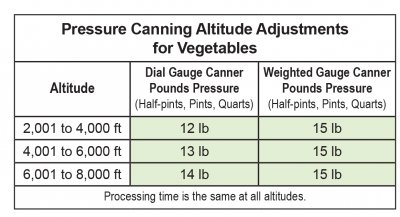Boiling Water Method | Fruits | Tomatoes and Tomato Products | Vegetables | Meat, Game and Poultry
Fish and Seafood | Stock and Soup | Troubleshooting | Care and Maintenance | Pressure Canner Comparison Guide

VEGETABLES CANNING BASICS
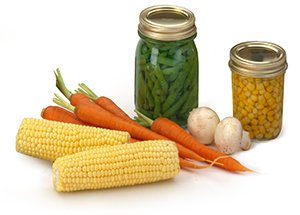 NOTE: Pressure Canning is the ONLY SAFE METHOD for canning vegetables.
NOTE: Pressure Canning is the ONLY SAFE METHOD for canning vegetables.
Young, tender, fresh, and slightly immature vegetables are better for canning than those which are overripe. As a rule, vegetables are best when canned immediately after picking, since flavor decreases upon standing and often unpleasant color changes take place. Avoid bruising vegetables because spoilage organisms grow more rapidly on bruised vegetables than on those that are unblemished.
Wash and prepare garden fresh vegetables as you would for cooking. When packing vegetables, always leave 1-inch headspace, or more if directed in recipe, in hot Mason jars.
Hot Pack: To hot pack vegetables, precook in boiling water until heated through. Pack precooked vegetables into hot jars and cover with boiling water. Whenever possible, the precooking water should be used as liquid to cover the vegetables after packing into jars. However, there are a few vegetables, such as greens and asparagus, which make the cooking water bitter and undesirable to use.
Raw Pack: To raw pack vegetables, simply place the prepared vegetables into hot jars and cover with boiling water.
Adding Salt
Vegetables may be canned with or without salt. Salt is used only for flavor, as it is not used in a large enough quantity to prevent spoilage. If salt is desired, use only canning or pickling salt. Table salt contains anti-caking agents that may cause cloudiness in the liquid inside the jars.
1/2 teaspoon for each pint jar, 1 teaspoon for each quart jar.
Adjusting for High Altitude Canning
- Dial Gauge Pressure Canner: When pressure canning at altitudes of 2,000 feet or below, process according to specific recipe. When canning at higher altitudes, process according to the Pressure Canning Chart below.
- Weighted Gauge Pressure Canner: When pressure canning at altitudes of 1,000 feet or below, process according to specific recipe. When canning at higher altitudes, process according to the Pressure Canning Chart below.
- Presto Precise® Digital Pressure Canner: When pressure canning, this canner automatically adjusts for altitude. There is no adjustment necessary.
PROCEDURES AND RECIPES
ASPARAGUS pints | quarts
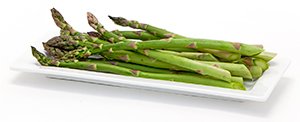 Wash and drain asparagus. Remove tough ends and scales. Rinse. Leave asparagus whole or cut into pieces.
Wash and drain asparagus. Remove tough ends and scales. Rinse. Leave asparagus whole or cut into pieces.
Hot Pack: Cover asparagus with boiling water and boil 2 to 3 minutes. Pack hot asparagus loosely in hot jars, leaving 1-inch headspace.
Raw Pack: Pack raw asparagus tightly in hot jars, leaving 1-inch headspace.
Add salt, if desired, as directed in Vegetables Canning Basics. Cover with boiling water, leaving 1-inch headspace. Remove air bubbles. Clean jar rims. Position lids on jars and adjust bands fingertip tight.
 Pressure Canning
Pressure Canning
Follow manufacturer’s instructions for pressure canning method and canner-specific jar capacity.
- Dial Gauge Canner. Process at 11 pounds pressure—Pints 30 minutes and Quarts 40 minutes. For processing above 2,000 feet altitude, see chart for recommended pounds pressure.
- Weighted Gauge Canner. Process at 10 pounds pressure—Pints 30 minutes and Quarts 40 minutes. For processing above 1,000 feet altitude, use 15 pounds pressure.
- Presto Precise® Digital Canner. Process Pints 30 minutes and Quarts 40 minutes. Canner automatically adjusts for altitude in pressure canning mode.
BEANS OR PEAS — Dry pints | quarts
.jpg) Sort out and discard any discolored seeds. Rehydrate beans or peas using one of the following methods:
Sort out and discard any discolored seeds. Rehydrate beans or peas using one of the following methods:
- Place dry beans or peas in a large pot and cover with water. Soak 12 to 18 hours in a cool place. Then drain.
- Cover beans with boiling water in a large pot. Boil 2 minutes, remove from heat and soak 1 hour. Then drain.
Hot Pack: Cover beans soaked by either method with fresh water and boil 30 minutes.
Add salt, if desired, to hot jars as directed in Vegetables Canning Basics. Fill jars with beans or peas and cooking water, leaving 1-inch headspace. Remove air bubbles. Clean jar rims. Position lids on jars and adjust bands fingertip tight.
 Pressure Canning
Pressure Canning
Follow manufacturer’s instructions for pressure canning method and canner-specific jar capacity.
- Dial Gauge Canner. Process at 11 pounds pressure—Pints 75 minutes and Quarts 90 minutes. For processing above 2,000 feet altitude, see chart for recommended pounds pressure.
- Weighted Gauge Canner. Process at 10 pounds pressure—Pints 75 minutes and Quarts 90 minutes. For processing above 1,000 feet altitude, use 15 pounds pressure.
- Presto Precise® Digital Canner. Process Pints 75 minutes and Quarts 90 minutes. Canner automatically adjusts for altitude in pressure canning mode.
BEANS — Fresh Lima, Butter, Pinto, Soy pints | quarts
Shell and wash young, tender beans thoroughly.
Hot Pack: Cover beans with boiling water and bring to a boil. Boil 3 minutes. Pack hot beans loosely in hot jars, leaving 1-inch headspace.
Raw Pack: Pack raw beans loosely in hot jars, leaving 1-inch headspace in pint jars. For quarts, leave 1 1/2-inch headspace if beans are small and 1 1/4-inch headspace if beans are large.
Add salt, if desired, as directed in Vegetables Canning Basics. Cover with boiling water, leaving 1-inch headspace. Remove air bubbles. Clean jar rims. Position lids on jars and adjust bands fingertip tight.
 Pressure Canning
Pressure Canning
Follow manufacturer’s instructions for pressure canning method and canner-specific jar capacity.
- Dial Gauge Canner. Process at 11 pounds pressure—Pints 40 minutes and Quarts 50 minutes. For processing above 2,000 feet altitude, see chart for recommended pounds pressure.
- Weighted Gauge Canner. Process at 10 pounds pressure—Pints 40 minutes and Quarts 50 minutes. For processing above 1,000 feet altitude, use 15 pounds pressure.
- Presto Precise® Digital Canner. Process Pints 40 minutes and Quarts 50 minutes. Canner automatically adjusts for altitude in pressure canning mode.
BEANS — Green, Wax, Italian pints | quarts
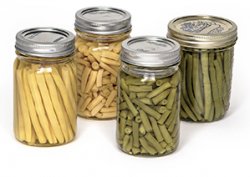 Wash young, tender beans thoroughly. Remove stem and blossom ends or any strings. Leave whole or cut into 1-inch pieces.
Wash young, tender beans thoroughly. Remove stem and blossom ends or any strings. Leave whole or cut into 1-inch pieces.
Hot Pack: Cover beans with boiling water and boil 5 minutes. Pack hot beans loosely in hot jars, leaving 1-inch headspace.
Raw Pack: Pack raw beans tightly in hot jars, leaving 1-inch headspace.
Add salt, if desired, as directed in Vegetables Canning Basics. Cover with boiling water, leaving 1-inch headspace. Remove air bubbles. Clean jar rims. Position lids on jars and adjust bands fingertip tight.
 Pressure Canning
Pressure Canning
Follow manufacturer’s instructions for pressure canning method and canner-specific jar capacity.
- Dial Gauge Canner. Process at 11 pounds pressure—Pints 20 minutes and Quarts 25 minutes. For processing above 2,000 feet altitude, see chart for recommended pounds pressure.
- Weighted Gauge Canner. Process at 10 pounds pressure—Pints 20 minutes and Quarts 25 minutes. For processing above 1,000 feet altitude, use 15 pound pressure.
- Presto Precise® Digital Canner. Process Pints 20 minutes and Quarts 25 minutes. Canner automatically adjusts for altitude in pressure canning mode.
BEETS pints | quarts
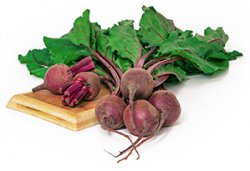 Trim tops of young, tender beets, leaving 1 to 2 inches of stem and root to reduce bleeding of color. Wash thoroughly.
Trim tops of young, tender beets, leaving 1 to 2 inches of stem and root to reduce bleeding of color. Wash thoroughly.
Hot Pack: Cover beets with boiling water and boil 15 to 25 minutes or until skins slip off easily. Remove skins, stems, and roots. Small beets may be left whole. Cut medium or large beets into 1/2-inch cubes or slices; halve or quarter very large slices. Pack hot beets in hot jars, leaving 1-inch headspace.
Add salt, if desired, as directed in Vegetables Canning Basics. Cover with boiling water, leaving 1-inch headspace. Remove air bubbles. Clean jar rims. Position lids on jars and adjust bands fingertip tight.
 Pressure Canning
Pressure Canning
Follow manufacturer’s instructions for pressure canning method and canner-specific jar capacity.
- Dial Gauge Canner. Process at 11 pounds pressure—Pints 30 minutes and Quarts 35 minutes. For processing above 2,000 feet altitude, see chart for recommended pounds pressure.
- Weighted Gauge Canner. Process at 10 pounds pressure—Pints 30 minutes and Quarts 35 minutes. For processing above 1,000 feet altitude, use 15 pounds pressure.
- Presto Precise® Digital Canner. Process Pints 30 minutes and Quarts 35 minutes. Canner automatically adjusts for altitude in pressure canning mode.
CARROTS pints | quarts
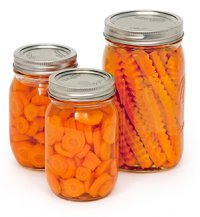 Wash thoroughly and peel young, tender carrots. Carrots may be left whole, sliced, or diced.
Wash thoroughly and peel young, tender carrots. Carrots may be left whole, sliced, or diced.
Hot Pack: Cover carrots with boiling water, bring to a boil, and simmer 5 minutes. Pack hot carrots in hot jars, leaving 1-inch headspace.
Raw Pack: Pack raw carrots tightly in hot jars, leaving 1-inch headspace.
Add salt, if desired, as directed in Vegetables Canning Basics. Cover with boiling water, leaving 1-inch headspace. Remove air bubbles. Clean jar rims. Position lids on jars and adjust bands fingertip tight.
 Pressure Canning
Pressure Canning
Follow manufacturer’s instructions for pressure canning method and canner-specific jar capacity.
- Dial Gauge Canner. Process at 11 pounds pressure—Pints 25 minutes and Quarts 30 minutes. For processing above 2,000 feet altitude, see chart for recommended pounds pressure.
- Weighted Gauge Canner. Process at 10 pounds pressure—Pints 25 minutes and Quarts 30 minutes. For processing above 1,000 feet altitude, use 15 pounds pressure.
- Presto Precise® Digital Canner. Process Pints 25 minutes and Quarts 30 minutes. Canner automatically adjusts for altitude in pressure canning mode.
CORN — Whole Kernel pints | quarts
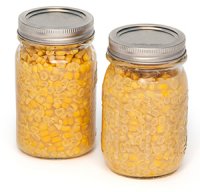 Husk and remove silk from young, tender, freshly picked corn; wash ears. Blanch 3 minutes in boiling water. Cut corn from cob at about three-fourths the depth of the kernel. Do not scrape cob.
Husk and remove silk from young, tender, freshly picked corn; wash ears. Blanch 3 minutes in boiling water. Cut corn from cob at about three-fourths the depth of the kernel. Do not scrape cob.
Hot Pack: For each quart of corn, add 1 cup boiling water. Bring to a boil and simmer 5 minutes. Pack hot corn loosely in hot jars, leaving 1-inch headspace.
Raw Pack: Pack raw corn loosely in hot jars, leaving 1-inch headspace.
Add salt, if desired, as directed in Vegetables Canning Basics. Cover with boiling water, leaving 1-inch headspace. Remove air bubbles. Clean jar rims. Position lids on jars and adjust bands fingertip tight.
 Pressure Canning
Pressure Canning
Follow manufacturer’s instructions for pressure canning method and canner-specific jar capacity.
- Dial Gauge Canner. Process at 11 pounds pressure—Pints 55 minutes and Quarts 85 minutes. For processing above 2,000 feet altitude, see chart for recommended pounds pressure.
- Weighted Gauge Canner. Process at 10 pounds pressure—Pints 55 minutes and Quarts 85 minutes. For processing above 1,000 feet altitude, use 15 pounds pressure.
- Presto Precise® Digital Canner. Process Pints 55 minutes and Quarts 85 minutes. Canner automatically adjusts for altitude in pressure canning mode.
GREENS pints | quarts
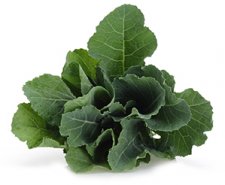 Sort young, tender, freshly picked greens; discard wilted or tough leaves, stems, and roots. Wash greens thoroughly.
Sort young, tender, freshly picked greens; discard wilted or tough leaves, stems, and roots. Wash greens thoroughly.
Hot Pack: Blanch 1 pound of greens at a time until well wilted (about 3 to 5 minutes). Pack hot greens loosely in hot jars, leaving 1-inch headspace.
Add salt, if desired, as directed in Vegetables Canning Basics. Cover with fresh boiling water, leaving 1-inch headspace. Remove air bubbles. Clean jar rims. Position lids on jars and adjust bands fingertip tight.
 Pressure Canning
Pressure Canning
Follow manufacturer’s instructions for pressure canning method and canner-specific jar capacity.
- Dial Gauge Canner. Process at 11 pounds pressure—Pints 70 minutes and Quarts 90 minutes. For processing above 2,000 feet altitude, see chart for recommended pounds pressure.
- Weighted Gauge Canner. Process at 10 pounds pressure—Pints 70 minutes and Quarts 90 minutes. For processing above 1,000 feet altitude, use 15 pounds pressure.
- Presto Precise® Digital Canner. Process Pints 70 minutes and Quarts 90 minutes. Canner automatically adjusts for altitude in pressure canning mode.
MUSHROOMS half-pints | pints
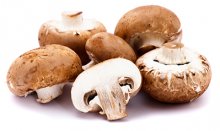 Trim stems and discolored parts of mushrooms. Soak mushrooms in cold water for 10 minutes to remove soil. Wash in clean water. Leave small mushrooms whole; cut larger ones in halves or quarters.
Trim stems and discolored parts of mushrooms. Soak mushrooms in cold water for 10 minutes to remove soil. Wash in clean water. Leave small mushrooms whole; cut larger ones in halves or quarters.
Hot Pack: Cover mushrooms with water and boil 5 minutes. Pack hot mushrooms in hot jars, leaving 1-inch headspace. For better color, add 1/8 teaspoon of ascorbic acid per pint.
Add salt, if desired, as directed in Vegetables Canning Basics. Cover with boiling water, leaving 1-inch headspace. Remove air bubbles. Clean jar rims. Position lids on jars and adjust bands fingertip tight.
 Pressure Canning
Pressure Canning
Follow manufacturer’s instructions for pressure canning method and canner-specific jar capacity.
- Dial Gauge Canner. Process at 11 pounds pressure—Half-pints and Pints 45 minutes. For processing above 2,000 feet altitude, see chart for recommended pounds pressure.
- Weighted Gauge Canner. Process at 10 pounds pressure—Half-pints and Pints 45 minutes. For processing above 1,000 feet altitude, use 15 pounds pressure.
- Presto Precise® Digital Canner. Process Half-pints and Pints 45 minutes. Canner automatically adjusts for altitude in pressure canning mode.
OKRA pints | quarts
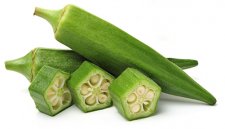 Wash and trim young, tender okra pods. Remove stem, without cutting into pods if okra is to be canned whole. If desired, slice okra into 1-inch pieces.
Wash and trim young, tender okra pods. Remove stem, without cutting into pods if okra is to be canned whole. If desired, slice okra into 1-inch pieces.
Hot Pack: Cover okra with hot water and boil 2 minutes. Pack hot okra in hot jars, leaving 1-inch headspace.
Add salt, if desired, as directed in Vegetables Canning Basics. Cover with boiling water, leaving 1-inch headspace. Remove air bubbles. Clean jar rims. Position lids on jars and adjust bands fingertip tight.
 Pressure Canning
Pressure Canning
Follow manufacturer’s instructions for pressure canning method and canner-specific jar capacity.
- Dial Gauge Canner. Process at 11 pounds pressure—Pints 25 minutes and Quarts 40 minutes. For processing above 2,000 feet altitude, see chart for recommended pounds pressure.
- Weighted Gauge Canner. Process at 10 pounds pressure—Pints 25 minutes and Quarts 40 minutes. For processing above 1,000 feet altitude, use 15 pounds pressure.
- Presto Precise® Digital Canner. Process Pints 25 minutes and Quarts 40 minutes. Canner automatically adjusts for altitude in pressure canning mode.
PEAS — Green pints | quarts
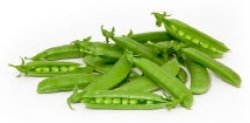 Wash and shell young, tender freshly picked green peas. Rinse.
Wash and shell young, tender freshly picked green peas. Rinse.
Hot Pack: Cover peas with boiling water and bring to a boil. Boil 2 minutes. Pack hot peas loosely in hot jars, leaving 1-inch headspace. Do not shake or press down.
Raw Pack: Pack raw peas loosely in hot jars, leaving 1-inch headspace. Do not shake or press down.
Add salt, if desired, as directed in Vegetables Canning Basics. Cover with boiling water, leaving 1-inch headspace. Remove air bubbles. Clean jar rims. Position lids on jars and adjust bands fingertip tight.
 Pressure Canning
Pressure Canning
Follow manufacturer’s instructions for pressure canning method and canner-specific jar capacity.
- Dial Gauge Canner. Process at 11 pounds pressure—Pints and Quarts 40 minutes. For processing above 2,000 feet altitude, see chart for recommended pounds pressure.
- Weighted Gauge Canner. Process at 10 pounds pressure—Pints and Quarts 40 minutes. For processing above 1,000 feet altitude, use 15 pounds pressure.
- Presto Precise® Digital Canner. Process Pints and Quarts 40 minutes. Canner automatically adjusts for altitude in pressure canning mode.
PEPPERS — Hot or Sweet (including bell, chile, jalapeño, and pimento) | pints
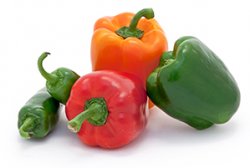 Preparation of chile peppers: Cut two or four slits in each pepper. Blister using one of the following methods:
Preparation of chile peppers: Cut two or four slits in each pepper. Blister using one of the following methods:
- Oven or broiler method: Place chile peppers in a 400°F oven or broiler for 6 to 8 minutes until skins blister.
- Range-top method: Cover hot burner, either gas or electric, with heavy wire mesh. Place chile peppers on wire mesh for several minutes until skins blister.
Allow peppers to cool. Place in a pan and cover with a damp cloth. After several minutes, peel peppers. Remove stems and seeds.
Preparation of other peppers: Remove stems and seeds; blanch 3 minutes.
Hot Pack: Small peppers may be left whole. Large peppers may be quartered. Pack peppers loosely in hot jars, leaving 1-inch headspace.
Add salt, if desired, as directed in Vegetables Canning Basics. Cover with boiling water, leaving 1-inch headspace. Remove air bubbles. Clean jar rims. Position lids on jars and adjust bands fingertip tight.
 Pressure Canning
Pressure Canning
Follow manufacturer’s instructions for pressure canning method and canner-specific jar capacity.
- Dial Gauge Canner. Process at 11 pounds pressure—Pints 35 minutes. For processing above 2,000 feet altitude, see chart for recommended pounds pressure.
- Weighted Gauge Canner. Process at 10 pounds pressure—Pints 35 minutes. For processing above 1,000 feet altitude, use 15 pounds pressure.
- Presto Precise® Digital Canner. Process Pints 35 minutes. Canner automatically adjusts for altitude in pressure canning mode.
POTATOES — Sweet pints | quarts
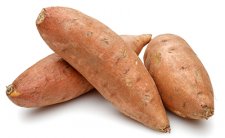 Wash small to medium size sweet potatoes.
Wash small to medium size sweet potatoes.
Hot Pack: Boil or steam sweet potatoes just until partially soft (15 to 20 minutes). Remove skins and cut into pieces of uniform size. CAUTION! In accordance with USDA guidelines, do not mash or puree potatoes as processing time may not be adequate for mashed or pureed product. Pack hot sweet potatoes in hot jars, leaving 1-inch headspace.
Add salt, if desired, as directed in Vegetables Canning Basics. Cover with boiling water, leaving 1-inch headspace. Remove air bubbles. Clean jar rims. Position lids on jars and adjust bands fingertip tight.
 Pressure Canning
Pressure Canning
Follow manufacturer’s instructions for pressure canning method and canner-specific jar capacity.
- Dial Gauge Canner. Process at 11 pounds pressure—Pints 65 minutes and Quarts 90 minutes. For processing above 2,000 feet altitude, see chart for recommended pounds pressure.
- Weighted Gauge Canner. Process at 10 pounds pressure—Pints 65 minutes and Quarts 90 minutes. For processing above 1,000 feet altitude, use 15 pounds pressure.
- Presto Precise® Digital Canner. Process Pints 65 minutes and Quarts 90 minutes. Canner automatically adjusts for altitude in pressure canning mode.
POTATOES — White pints | quarts
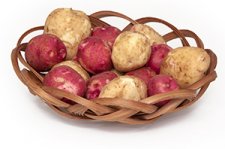 Wash, peel, and rinse new potatoes 1 to 2 inches in diameter. If desired, cut into 1/2-inch cubes. Place in ascorbic acid solution (1 teaspoon ascorbic acid to 1 gallon water) to prevent darkening. Drain.
Wash, peel, and rinse new potatoes 1 to 2 inches in diameter. If desired, cut into 1/2-inch cubes. Place in ascorbic acid solution (1 teaspoon ascorbic acid to 1 gallon water) to prevent darkening. Drain.
Hot Pack: Cover potatoes with hot water and bring to a boil. Boil whole potatoes for 10 minutes, cubes for 2 minutes. Pack hot potatoes in hot jars, leaving 1-inch headspace.
Add salt, if desired, as directed in Vegetables Canning Basics. Cover with boiling water, leaving 1-inch headspace. Remove air bubbles. Clean jar rims. Position lids on jars and adjust bands fingertip tight.
 Pressure Canning
Pressure Canning
Follow manufacturer’s instructions for pressure canning method and canner-specific jar capacity.
- Dial Gauge Canner. Process at 11 pounds pressure—Pints 35 minutes and Quarts 40 minutes. For processing above 2,000 feet altitude, see chart for recommended pounds pressure.
- Weighted Gauge Canner. Process at 10 pounds pressure—Pints 35 minutes and Quarts 40 minutes. For processing above 1,000 feet altitude, use 15 pounds pressure.
- Presto Precise® Digital Canner. Process Pints 35 minutes and Quarts 40 minutes. Canner automatically adjusts for altitude in pressure canning mode.
PUMPKIN AND WINTER SQUASH pints | quarts
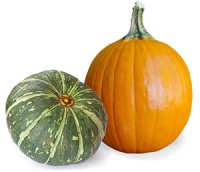 Select pumpkins and squash with a hard rind and mature pulp of an acceptable quality for cooking fresh. Small pumpkins (pie or sugar varieties) yield a better quality. Wash and remove seeds from small size pumpkins or squash. Cut into 1-inch slices and peel. Cut flesh into 1-inch cubes.
Select pumpkins and squash with a hard rind and mature pulp of an acceptable quality for cooking fresh. Small pumpkins (pie or sugar varieties) yield a better quality. Wash and remove seeds from small size pumpkins or squash. Cut into 1-inch slices and peel. Cut flesh into 1-inch cubes.
Hot Pack: Boil cubes in water for 2 minutes. CAUTION! In accordance with USDA guidelines, do not mash or puree as processing time may not be adequate for pureed product. Pack hot pumpkin or squash cubes loosely in hot jars, leaving 1-inch headspace.
Add salt, if desired, as directed in Vegetables Canning Basics. Cover with boiling water, leaving 1-inch headspace. Remove air bubbles. Clean jar rims. Position lids on jars and adjust bands fingertip tight.
 Pressure Canning
Pressure Canning
Follow manufacturer’s instructions for pressure canning method and canner-specific jar capacity.
- Dial Gauge Canner. Process at 11 pounds pressure—Pints 55 minutes and Quarts 90 minutes. For processing above 2,000 feet altitude, see chart for recommended pounds pressure.
- Weighted Gauge Canner. Process at 10 pounds pressure—Pints 55 minutes and Quarts 90 minutes. For processing above 1,000 feet altitude, use 15 pounds pressure.
- Presto Precise® Digital Canner. Process Pints 55 minutes and Quarts 90 minutes. Canner automatically adjusts for altitude in pressure canning mode.

Boiling Water Method | Fruits | Tomatoes and Tomato Products | Vegetables | Meat, Game and Poultry
Fish and Seafood | Stock and Soup | Troubleshooting | Care and Maintenance | Pressure Canner Comparison Guide

